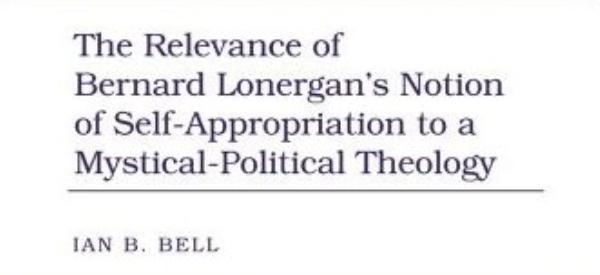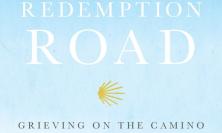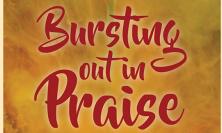In North America and especially in Europe, the forces of secularisation are strong and the practice of organised religion seems to be in long-term decline. At the same time, book sales in these countries give witness to a lively interest in matters of spirituality/mysticism and in discussions of the political impact of religion. One suspects that it is often different sets of readers who are buying these two different kinds of books, so Ian Bell’s placing of the terms ‘mystical’ and ‘political’ together in the title of this book is striking. In outlining his project for a ‘mystical-political theology’, Bell offers a summary of some representative thinkers in both mystical theology and political theology and seeks to relate the thought of the Canadian Jesuit Bernard Lonergan to each of these currents (Lonergan lived from 1904-1984 and is especially well known for his two main works: Insight: A Study in Human Understanding (1954) and Method in Theology (1971)). Thus, this book offers both a helpful overview of some prominent themes in theology today and an introduction to the ideas of a thinker whose importance, arguably, is only beginning to be recognised.
In his introduction, Bell analyses what he calls the problem of the ‘split soul’ in the modern West. The split soul phenomenon, essentially, refers to the privatising of spirituality and its separation from ethical and, ultimately, from political commitment. Bell introduces his discussion by insisting that the split is not found in Biblical spirituality but rather can be traced back to certain misguided philosophies in the late middle ages. He asserts that one result of the split soul mentality today is that there exist separate literatures in the areas of mysticism and of political theory. In Chapter 1, he offers an overview of two prominent mystical theologians (Evelyn Underhill and William Johnson) and two political theologians (Gustavo Gutiérrez and Dorothee Sölle) and suggests that elements of the split soul mentality are to be found in each of them. Regarding these and some other authors, he had already asserted in his introduction:
They have all fallen into this mistake of concentrating on the experience (i.e. mysticism or political action) to the neglect of the subject. (p. 12)
He claims that even though those writing on mysticism are obviously concerned with a certain form of human experience, they nevertheless too often fail to locate mystical experience within the related conscious experiences of how we come to know and to decide. Crucial connections between religious experience and ethical action are thus missed. Similarly, and perhaps more obviously, Bell claims that those writing in the area of political theology can so emphasise issues of action in history that they neglect the question of just how subjects who are acting in history pass through the moments of knowing and deciding that determine their action. In this manner the importance of religious experience in inspiring ethical action can be neglected.
Having thus stated this problem of ‘the neglected subject,’ Bell devotes Chapters 2, 3, and 4 to helping us rediscover it and relies on the thought of Bernard Lonergan to do this. Finally, in Chapter 5, he returns to a discussion of the current state of mystical and political theologies and explains how a rediscovery of the subject can enrich each of these lines of thought and help to relate them to one another.
Lonergan on Self-Appropriation
Lonergan is a difficult author to understand and introducing his thought in the context of trying to overcome the ‘split soul’ dilemma seems helpful indeed. Lonergan’s basic account of the subject is that every individual is comprised of an innate drive to self-transcendence which stimulates him or her to pass regularly through four levels of consciousness: experience, understanding, judging, and deciding. With regard to this innate drive, he asserts that we are free to employ it authentically or not but that it characterises us nonetheless.
Now, already at the first level of consciousness there is a kind of filtering going on with regard to what kind of sense data we are interested in noticing. So it is that Bell offers an account of Lonergan’s analysis of the following patterns of experience: biological, practical, dramatic, intellectual, and aesthetic. Still, Bell stresses that whatever kind of experience filter we are employing, we still function in a manner that works from experience to insight, to judgment, and then, if the occasion demands, to decision.
A further point to note is that most of the time we employ this structure in a spontaneous way without quite acknowledging that this structure exists. Indeed, we can often confuse properly human knowing with a kind of ‘taking a good look’ whereby concepts concerning the realities we are engaging with instantly ‘pop up’ into our head. This mistaken notion of knowing can come to inform sophisticated philosophies. We have already adverted to Bell’s claim about the wrong turn taken in philosophy in the late middle ages. The consequences of this mistaken philosophy, according to Bell, include a materialist tendency (things at which it is easier to ‘take a good look’) and result in a society that has difficulty in allowing ethical concerns, not to mention religious concerns, to exercise the influence they should on our culture.
In this context, Bell stresses the importance of Lonergan’s invitation to intellectual conversion. Here an individual reflects upon his or her own structure of knowing and choosing and affirms as true the fact that he or she has a self-transcending structure comprised of four levels of consciousness. Now, intellectual conversion reveals to us not only how we come to judge facts but also how we judge values and move ourselves to decide. The question is then placed in stark relief as to whether we are going to choose to be true to this structure. So it is that Lonergan speaks also of moral conversion: this event occurs as the culmination of a process where we first recognise our ability to become originators of value; where we acknowledge feelings of attraction to do just this; and, finally, where we decide to become such originators of values consistently and constantly.
Finally, Bell outlines Lonergan’s account of how our drive to self-transcendence has an open-ended tendency that has a notion of the existence of a God that is the ultimate object of our desires. Often we become aware of this tendency in a paradoxical way. It is often in the midst of a failure of our best intentions to act morally that we utter an appeal to this half-intuited Mystery that is present to us. Next, there can occur the event that Lonergan calls ‘religious conversion.’ This event is primarily one where God becomes an actor and where we become recipients in a gift of an unconditional love that is where ‘God’s love floods our hearts through the Holy Spirit given to us’ (Romans 5:5). This event of religious conversion can be as dramatic as St. Paul being made to fall off his horse, but it can also be gradual and not explicitly noticed – an experience that is common when individuals have grown up in a religious context and have been helped also toward moral conversion in a supportive educational environment. However, one way or another it will usually be the case that a major fruit of religious conversion will be an ability to actually carry out the decision involved in moral conversion. So it is that Bell and Lonergan speak of religious conversion initiating a process of healing bad habits and changing them to good habits so that, over time, a process of achieving true integrity of life is well underway. It is in the context of Lonergan’s explanation of spiritual and moral growth that Bell seeks to add the notion of a ‘mystical pattern of experience’ to the list of patterns of experience that Lonergan explicitly outlined (Bell, 83).
Mystical-Political Theology
Now, as was the case with his account of intellectual activity, Bell points out that moral and religious conversion may unfold in some individuals in a spontaneous way that is little reflected upon. On the other hand others may take explicit note of their religious and moral conversion and may seek to analyse them. He identifies two steps in this process of reflexive spiritual living. The first is to be a mystic: a person who has recognised his or her religious conversion for the remarkable event that it is and who works at both staying in touch with this experience so as to let it increasingly influence his or her life (164-167). A second step is to seek to become a theologian involved in a mediation between a culture and the significance and role of a religion in that matrix (see, Lonergan Method in Theology, Introduction). He points out that not every mystic needs to be a theologian but he does insist that every theologian needs to be a mystic.
With Lonergan, Bell points out that a theologian seeks to perform an explicitly intellectual task of developing ideas that help to guide the practices of a religious community. Furthermore, Bell asserts that these practices must include efforts by the Church to dialogue with and to influence the culture and organisational structures of the society in which it finds itself. So it is that in addition to stating that every theologian needs to be a mystic, he asserts every theologian needs, either individually or in collaboration with other theologians, to have an orientation towards what can be called political theology – that kind of theology which is oriented toward a transformation of history into a greater likeness to the Reign of God. Bell points out that at root, the point of reference for how mystical theology must always be related to political theology is that genuine religious conversion will always issue forth in a moral conversion that is effective; and acting morally, ultimately, must extend beyond private actions to a concern for society and culture.
In Chapter 5, Bell returns to the question of the split soul mentality in general and to the split that exists in particular between mystical theology and political theology today. He appeals to theologians to work at their own conversions: religious, moral, and intellectual. He then stresses that theology done in the light of this appropriation of subjectivity will always seek to be part of a collaborative project that is both mystical and political.
Critique
In the opinion of this reviewer, Ian Bell’s book addresses issues of paramount importance with answers of real significance. However, this book also contains certain weaknesses. One suspects that it first saw light as a doctoral thesis and it uses a style of arguing that those being introduced to Lonergan for the first time might not find helpful. Bell’s first chapter is rather ambitious and one feels he is straining a little to establish his point that there is a ‘neglect of the subject’ in the four authors that he investigates. In the chapters devoted to Lonergan’s thought, Bell makes frequent reference to other commentators on Lonergan and often enters into debate with them. As a consequence, these chapters do not always follow a straightforward path of expounding Lonergan’s own thought based on the evidence of Lonergan’s own writings.
A related point is that, in Bell’s rather complex kind of arguing, I am not sure that the best strategies are adopted regarding how to explain how Lonergan’s thought can assist a mystical-political theology. In Bell’s discussion of matters mystical, he discusses at length issues appertaining to Lonergan’s analysis of patterns of experience but does not devote much time to Lonergan’s explanation of religious conversion. It would seem to this reviewer that any discussion of Lonergan on mysticism should take into account his doctoral thesis and should seek to explain how Lonergan’s notion of religious conversion is really a modern transposition of Aquinas’ notion of operative grace (which Lonergan studied for that degree). In this respect, for a reader interested in reading more about Lonergan and approaching this from the angle of spirituality I would recommend that he or she also seek out another book: Lonergan and Spirituality: Towards a Spiritual Integration by Tad Dunne SJ (Chicago, Loyola University Press, 1985). Bell refers to this book often and in fact borrows his notion of the split soul from it. This book is less ambitious in its scope than that of Bell and is aimed at first-time readers of Lonergan’s thought.
On issues appertaining to political theology, a first point to note is that Bell devotes only part of his final chapter directly to this topic. When he does discuss ‘Self Appropriation and Political Theology’ (169-187) his direct discussion of Lonergan’s writings is limited to some of Lonergan’s ethical writings on the human good. In this manner, Bell misses the opportunity to explain how important are the goals expressed by political theologians for Lonergan. In Method in Theology, Lonergan primarily understands political theology in terms of his final functional specialty, communications, of which he declares: ‘It is a major concern for it is in this final stage that theological reflection bears fruit’ (Method in Theology, 355). Similarly, Lonergan speaks of the ‘reciprocal dependence’ (Method in Theology, 142) of the other steps of theology on the last step. The point here is that theologians operating in this specialty can challenge not only the culture in which they live but also their fellow theologians who may not be addressing the valid questions arising from the culture (e.g. the complicity of the Church in unjust political structures, in discriminating against women etc.). Finally, having discussed the thought of Gustavo Guttiérez in Chapter 1, it is a pity that Bell does not note that Lonergan devoted the final years of his life to a study of macroecomomics because of a meeting he had with Gutiérrez, who complained of how liberation theology had not been able to find a theory of economics that would complement its efforts to produce an authentically Christian theology that serves historical transformation.
With these qualifications I do recommend this book for reading. After all, there is always going to be a trade-off between a deep treatment of the thought of an author and commenting on how his or her thought engages with that of others. Indeed, I hope that this book will touch a nerve in the manner in which it addresses issues of such topical concern. Above all, I hope it will whet an appetite to study further this remarkable thinker, Bernard Lonergan, whose thought has the widest of applications and potential importance today.
The reviewer, Gerard Whelan SJ, teaches theology at the Pontifical Gregorian University, Rome.






